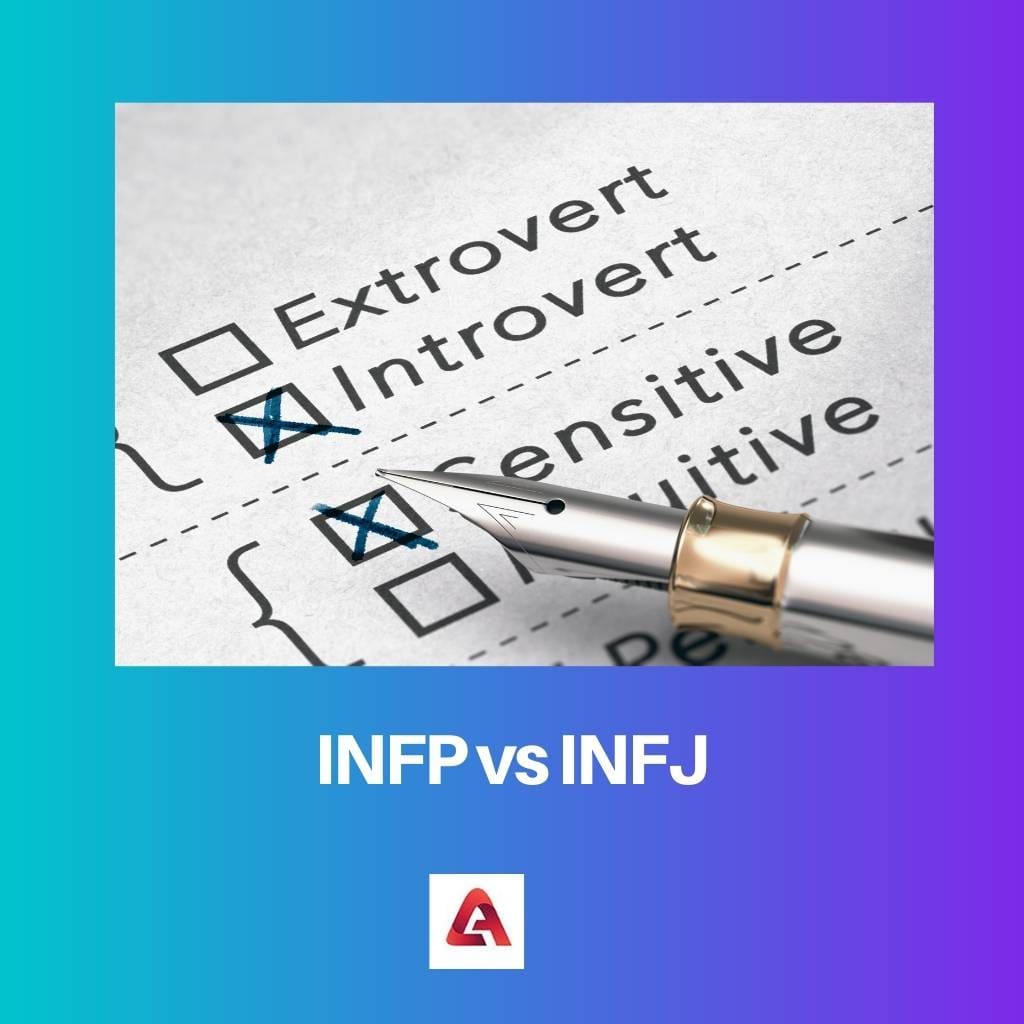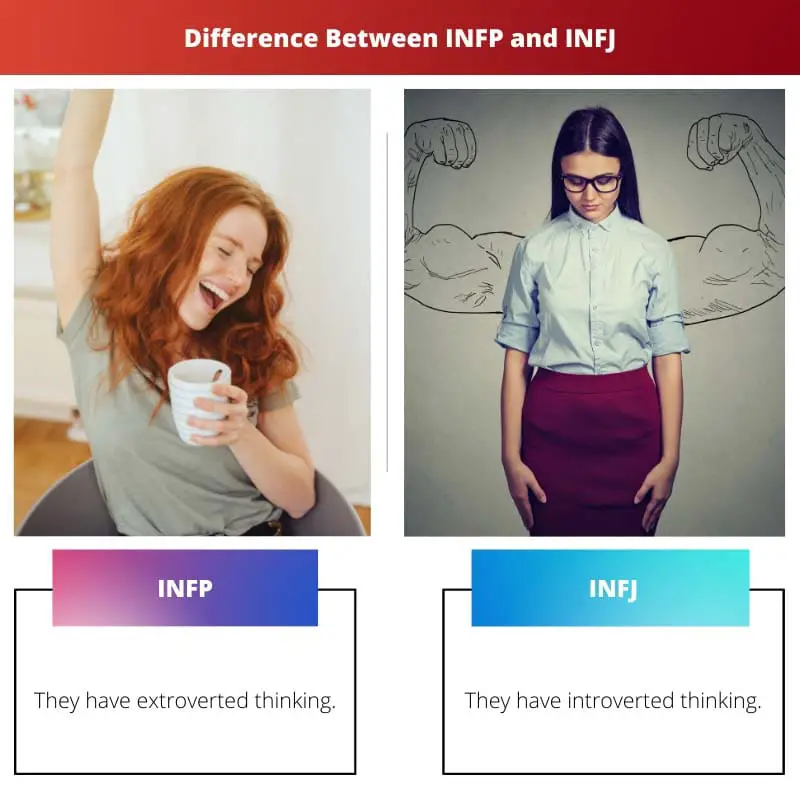Every person has a different personality. In the simplest of terms, every person has different thought processes, innate responses, feelings, moods, behaviour, and actions that are unique only to that person himself.
This constitutes his personality, in short. Personalities can be of various types. According to the Myers- Briggs type personality indicator developed by Carl Jung, personality can be divided into various types based on four categories thinking, feeling, sensation and intuition.
INFP and INFJ are two rare types of personalities.
Key Takeaways
- INFPs and INFJs are both introverted personality types, but INFPs are more focused on personal values and emotions, while INFJs are more focused on intuition and empathizing with others.
- INFPs tend to be more creative and imaginative than INFJs, who are more practical and strategic.
- INFPs may struggle with indecision and self-doubt, while INFJs may struggle with setting boundaries and assertiveness.
INFP vs INFJ
The difference between INFP and INFJ is that an INFP personality is an introverted, intuitive, feeling and prospective person while an INFP is an introverted, intuitive, feeling, judging person. Although both might seem to be similar on the surface, they are, in reality, exactly what we call the opposite of each other.

INFP personalities are also called mediators as they show extreme care and imagination in what they do. They might seem to be introverted people but in reality, they are very creative and imaginative and have a very colourful mind and inner life. They are also very emotional beings.
INFJ personalities are also called advocates as they are very judging, structured and opinionated. They are introverted but are very determined and thoughtful. They are also imaginative and also work in ideals. They like to stand up for what’s right, giving them the name of Advocates.
Comparison Table
| Parameters of Comparison | INFP | INFJ |
|---|---|---|
| Thinking | They have extroverted thinking. | They have introverted thinking. |
| Feeling | They have introverted feelings. | They have extroverted feeling. |
| Sensation | They have introverted sensing | They have extroverted sensing. |
| Intuition | They have extroverted intuition. | They have introverted intuition. |
| Characteristics trait | They are introverts that can see the bigger picture and understand the human mind better than most. | They are introverts that can feel what others feel also they can turn their ideas into actions. |
| Emotions | They understand the human mind and the emotions of others very well. | They empathize with a second person and might also tune in to their emotion and overrun their own. |
| Need for Validation | Validation of their thoughts is not important for them as long they are understood. | Validation of their thinking is very important for their mental satisfaction |
| Need for Order | They are more carefree than the others. | Being determined and intuitive they like being on time and having a plan for everything. |
What is INFP?
INFP are a type of personality found in humans. They refer to introverted people who have highly developed senses and feelings within their minds. Their intuition and thoughts are expressed creatively and thoughtfully, reflecting their perspective of life.
They tend to lead a life with a perspective. They are open-minded people ready to learn from the environment. They are good listeners and understand human minds very well.
They are very curious and want to know about the human condition and like spending time with a person to know them inside out.
Their thoughts are very artistic and not analytical, and they appear to be carefree and non-judgmental outwardly, but inside, they are the opposite. INFP people are great at career counselling and creative writing, like book authors, fiction writers, etc.
William Shakespeare, Audrey Hepburn, and JR Tolkien are some of the famous INFPs that you might have heard of.
Thus these people are effective in reflecting others’ feelings, and they are very thoughtful and creative, they are also random and do not make strict plans.
Outwardly they may appear to be in control of their emotions, but on the inside, their introverted feeling and sensing make their mind run about in circles.
What is INFJ?
INFJ is a type of personality found in humans. They refer to introverted individuals whose intuition and thinking are introverted, making them weird in expressing what they think, while their sensing and feelings are extroverted, making them a very caring, empathizing personality.
These are highly creative and thoughtful people who have a plan in their minds. They are very organized and like having a plan for everything. These people also need validation for what they feel.
They tend to believe what they think is right and must be accepted by others that might be thought to be a judging personality.
INFJs, in contrast to INFPs, are not individualistic. They are more compassionate towards others’ feelings, they tune in to other emotions and might sometimes be overly sensitive.
Being a little stubborn, they can also be difficult to know properly however, they are very warm on the inside and are excellent friends and have long, meaningful relationships.
Some of the famous I did that you might know are Oprah Winfrey, Atticus Finch (a fictional character from the book “To Kill a Mockingbird “) etc. INFJs can be good in professions like teaching, non-fictional writers, Psychologists etc.
Main Differences Between INFP and INFJ
- INFPs have different cognitive functions (feeling, thinking, sensing, intuition) than that of INFJs, which makes them exactly opposites.
- INFPs are individualistic people and tend to understand their advantage before others, while INFJs take care of others’ needs first.
- INFPs are caring, yet they just reflect what you feel they do not empathize, while INFJs completely tune in to your emotion. Your heartbreak is their heartbreak.
- INFPs are not doers. They do not have plans. They are more laid back and go with the flow, while INFJs are idealistic. They have the special power to turn all their ideas into reality through well-calculated actions.
- INFPs are to be open-minded on the outside, while INFJs are opinionated and hence seem to be judging on the outside.
- INFPs are better listeners than INFJs, who are better talkers. They need to speak about what they think and need to be validated.

- https://psycnet.apa.org/psycinfo/2013-29682-000/
- https://personalityjunkie.com/04/cognitive-styles-thinkers-feelers-visual-spatial-verbal/

The insights into INFP and INFJ personalities provide a captivating exploration of human behavior and thought patterns. The nuanced details of their characteristics offer a deeper understanding of individual differences.
I completely agree, Florence. This analysis enhances our awareness of the rich tapestry of human personality.
Precisely, Florence. Delving into the traits of INFPs and INFJs allows for a more comprehensive comprehension of human psychology.
The comparison table you’ve provided is incredibly insightful. Understanding the different traits and tendencies of INFPs and INFJs allows for a more nuanced comprehension of human personality.
I completely agree, Zclarke. It’s intriguing to examine how these personality types navigate the world around them.
The INFP vs. INFJ comparison is intriguing. It’s compelling to explore how these personality types process information, make decisions, and interact with the world around them.
Absolutely, Harrison65. This analysis enriches our understanding of the multifaceted nature of human cognition and emotional responses.
Thank you for providing such a comprehensive comparison of the INFP and INFJ personalities. It’s interesting to see how their traits differ, even though they may seem similar at first glance.
I agree, Isabel. It’s fascinating to delve into the nuances of these personality types.
Absolutely, Isabel. The Myers-Briggs Type Indicator offers great insights into understanding human personality.
The distinction between INFP and INFJ personalities is fascinating. This analysis enhances our awareness of the diverse ways in which individuals engage with their emotions, thoughts, and surroundings.
Indeed, Sofia. This comparison underscores the richness of human personality and its multifaceted nature.
Thank you for elucidating the characteristics of INFP and INFJ personalities. The examination of their cognitive processes and emotional tendencies sheds light on the intricacies of human thought and behavior.
Well said, Samantha. The differences between INFPs and INFJs offer valuable insights into the diverse manifestations of human nature.
I couldn’t agree more, Samantha. This analysis underscores the complexity and diversity of individual personality traits.
I appreciate the detailed descriptions of INFP and INFJ individuals. It’s thought-provoking to learn about the inner workings of these unique personality types and how they relate to the world.
Absolutely, Ella02. The depth of insight into INFP and INFJ traits contributes to our understanding of the human psyche.
Thank you for this breakdown of the differences between INFP and INFJ personalities. It’s intriguing how their cognitive functions shape their approach to life and interactions with others.
Absolutely, Stacey. Learning about these personality types can deepen our understanding of human behavior.
I couldn’t agree more, Stacey. The distinct characteristics of INFPs and INFJs shed light on the complexity of human nature.
The examination of INFP and INFJ personalities is both enlightening and thought-provoking. Understanding their cognitive functions and emotional inclinations contributes to a more nuanced understanding of human psychology.
Absolutely, Jack52. This comparative analysis yields valuable insights into the diverse manifestations of human behavior and cognition.
The delineation of INFP and INFJ traits is intellectually stimulating. By exploring their distinct characteristics, we gain a deeper appreciation for the complexity and richness of human personality.
Well articulated, Qkennedy. The detailed examination of INFP and INFJ traits provides profound insights into the multifaceted nature of individual personalities.